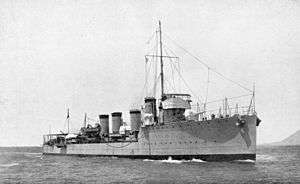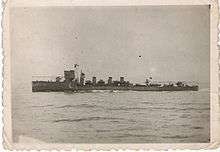Alsedo-class destroyer
 Alsedo in about 1925 | |
| Class overview | |
|---|---|
| Name: | Alsedo |
| Builders: | SECN, Naval Dockyard, Cartagena. |
| Operators: |
|
| Preceded by: | Bustamante class |
| Succeeded by: | Churruca class |
| Built: | 1920-1925 |
| In commission: | 1924-1961 |
| Completed: | 3 |
| Retired: | 3 |
| General characteristics [1] | |
| Type: | Destroyer |
| Displacement: |
|
| Length: | |
| Beam: | 8.23 m (27 ft 0 in) |
| Draught: | 4.57 m (15 ft 0 in) |
| Propulsion: | |
| Speed: | 34 knots (63 km/h; 39 mph) |
| Range: | 2,500 nmi (4,630 km; 2,877 mi) at 15 knots (28 km/h; 17 mph) |
| Complement: | 86 |
| Armament: |
|
The Alsedo class was a Spanish class of destroyer. Three ships were built, based on a British design, entering service from between 1924 and 1925. They all served through and survived the Spanish Civil War, two on the Republican side and one with the Nationalists, with the class finally retired in 1957–61.
Design and construction
On 17 February 1915, the Spanish Cortes (Parliament) passed a navy law authorising a large programme of construction for the Spanish Navy, including three destroyers of British design, the Alsedo class, to be built in Spain at the Sociedad Española de Construcción Naval (SECN) dockyard at Cartagena.[1][2]
The design chosen was similar to the Hawthorn Leslie variant of the M-class destroyer, a reasonably modern design for 1915. The ship was propelled by two geared steam turbines driving two shafts, and fed by four Yarrow boilers, giving a distinctive four-funneled silhouette. This machinery gave the ships a design speed of 34 knots (63 km/h; 39 mph), although Alsedo did reach a speed of 37.2 knots (68.9 km/h; 42.8 mph) during trials before its armament was fitted.[3]

The ship's main gun armament consisted of three Vickers 4-inch (102 mm) guns (license-built in Spain) in three single mounts, with one forward, one aft the third gun between the second and third funnels, while two 47 mm anti-aircraft guns protected against air attack. Four 21-inch (533 mm) torpedo tubes were mounted in twin banks, with the class being the first Spanish destroyers to carry torpedoes of this size.[3]
The ships were not laid down until 1920, as the First World War caused shortages of materials and equipment sourced from Britain. By this time, destroyer design had moved on, and the Alsedo class was obsolete, so plans to build a further three ships of the class were reconsidered, with a modern and much larger design selected which became the Churruca class.[3]
History
The three destroyers were launched between 1922 and 1923, and commissioned between 1924 and 1925.[1] When the Spanish Civil War broke out in July 1936, Alsedo and Lazaga's crews sided with the Republican side.[1] Velasco, however, alongside at Ferrol, declared for the Nationalists and was damaged by Republican shelling before Ferrol fell to the Nationalists on 21 July.[4]
.jpg)
Velasco was the only operational destroyer that sided with the Nationalists, until Italy transferred four old destroyers in 1937. This resulted in Velasco seeing heavy service, helping to sink the Republican submarine B6 on 19 September 1936, and taking part in the Battle of Cape Palos.[1] The two Republican destroyers were mainly occupied by escort duties, with Lazaga towing the British destroyer HMS Hunter to safety when Hunter struck a mine off Almeria in May 1937.[1]
Following the end of the war, all three destroyers continued to serve with the Spanish Navy until well into the 1950s,[1] with Alsedo and Velasco being stricken in 1957 and Lazaga in 1961.[5]
Ships
| Name | Laid Down[1] | Launched[1] | Commissioned[1] | Fate |
|---|---|---|---|---|
| Alsedo | 1920 | 26 October 1922 | 1924 | Stricken 1957[5] |
| Lazaga (Originally Juan Lazaga)[5] | June 1920[6] | March 1924 | 1925 | Stricken 1961[5] |
| Velasco | 1920 | June 1923 | 1925 | Stricken 1957[5] |
References
Notes
Sources
- Beevor, Antony (1999). The Spanish Civil War. London: Cassell. ISBN 0-304-35281-0.
- Blackman, Raymond V. B., ed. (1960). Jane's Fighting Ships 1960–61. London: Sampson Low, Marston & Co Ltd.
- Gardiner, Robert; Gray, Randal (1985). Conway's All The World's Fighting Ships 1906–1922. London: Conway Maritime Press. ISBN 0-85177-245-5.
- Whitley, M. J. (2000). Destroyers of World War Two: An International Encyclopedia. London: Cassell. ISBN 1-85409-521-8.
External links
| Wikimedia Commons has media related to Alsedo Class Destroyers. |
| ||||||||||||||
| ||||||||||||||||||||||||||||||||||||||||||||